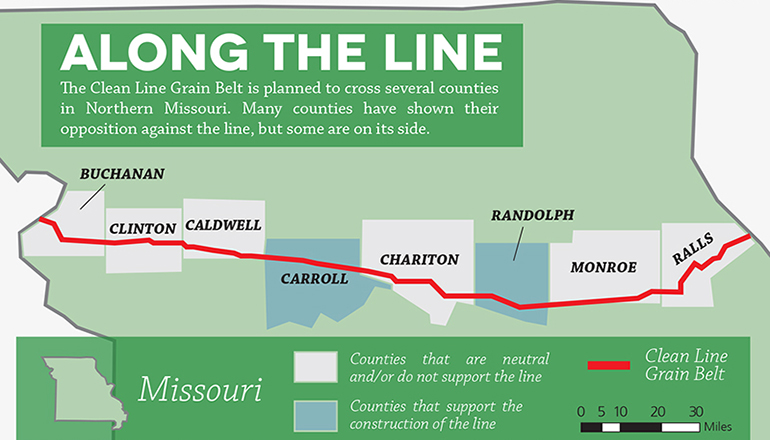The Missouri Public Service Commission has approved a request filed by Grain Belt Express Clean Line LLC (Grain Belt) which sought Commission authority and a certificate of convenience and necessity to construct, own, operate, control, manage and maintain a high voltage, direct current transmission line, and associated facilities within eight Missouri counties (Buchanan, Clinton, Caldwell, Carroll, Chariton, Randolph, Monroe, and Ralls). The Commission’s vote was 5-0. The Grain Belt project would traverse the states of Kansas, Missouri, Illinois, and Indiana, including approximately 206 miles in Missouri.
The Commission granted a CCN to Grain Belt determining: 1) there is a need for the service; 2) Grain Belt is qualified to provide the proposed service; 3) Grain Belt has the financial ability to provide the proposed service; 4) Grain Belt’s proposal is economically feasible, and 5) the service promotes the public interest.
The Commission stated the evidence in the case demonstrated that the Grain Belt project will create both short-term and long-term benefits to ratepayers and citizens of the state. In addition, the project would have a substantial and favorable effect on the reliability of electric service in Missouri.
“There can be no debate that our energy future will require more diversity in energy resources, particularly renewable resources,” said the Commission. “We are witnessing a worldwide, long-term and comprehensive movement towards renewable energy in general and wind energy specifically. Wind energy provides great promise as a source for affordable, reliable, safe and environmentally-friendly energy. The Grain Belt Project will facilitate this movement in Missouri, will thereby benefit Missouri citizens, and is, therefore, in the public interest.”
The Commission noted that any negative impacts of the project on the land and landowners will be mitigated by 1) a landowner protocol to protect landowners; 2) superior compensation payments; 3) a binding arbitration option for easement negotiations; 4) a decommissioning fund-a fund for this type of project would be the first of its kind in the country, and 5) an agricultural impact mitigation protocol to avoid or minimize negative agricultural impacts. Agricultural impacts will also be reduced because no more than nine acres of land in Missouri will be taken out of agricultural production as a result of project structures, and the proposed route does not directly impact the operation of any existing center pivot irrigation systems.
“Many of the landowners’ concerns will be addressed through carefully considered conditions placed on the CCN,” said the Commission.







